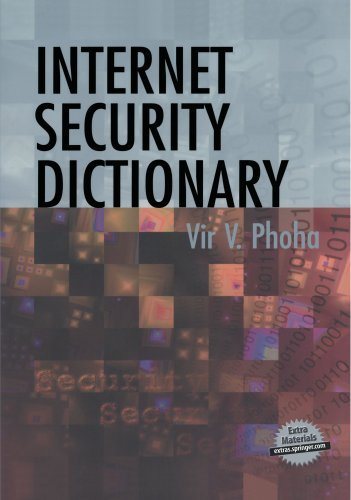Internet Security Dictionary

Free Download Internet Security Dictionary by Vir V. Phoha
English | PDF (True) | 250 Pages | 2002 | ISBN : 0387952616 | 7.9 MB
R ecent years have seen an explosive growth of the Internet. When the Internet passed from government and academic realms to the public sec- tor, it brought along a laissez-faire attitude about security. Its explosive growth, flaws in its basic structure, its facilitation of instant access to infor- mation repositories, and its widespread availability has made it increasingly vulnerable. There have been many malicious attempts, or attacks to exploit this vulnerability of the Internet from all over the world; the attacks on the Internet have kept pace with the growth of the Internet.
The natural instinct of individuals, organizations, and nations to protect themselves against attacks and operational intrusions or upsets in the flow of information has spawned a high level of interest, research activity, and tech- nological developments in the Internet security field. New security protocols, and new countermeasures against attacks that break, slow, or inconvenience users and organizations are evolving every day. These developments constantly introduce new terms and concepts into the Internet security vocabulary. Al- though nascent, the field has gained sufficient maturity that its vocabulary can begin to be standardized for common use by professionals. This dictionary is an effort to organize and define these terms precisely and coherently.
The purpose of this dictionary is to provide reliable definitions and descrip- tions of Internet security terms in clear and precise English. Designed as a tool to bring about a common understanding of technical terms to the lay user and the professional, the dictionary will serve as an introduction to Internet security for the nonprofessional user who is looking for the precise meaning(s) of a specific term or for a cursory overview of the field. This dictionary should also serve as a reference for the security professional who is an expert in a specialized
area and who may need to refer to precise or commonly accepted meanings of terms.
The terms collected in this dictionary are those used by researchers, design- ers, developers, manufacturers, vendors, system administrators, and other users of Internet security technology. These terms were taken primarily from the technical literature, including journal articles and magazines, books, and Re- quests for Comments (RFCs).
This dictionary covers eight main areas: ( 1 ) authentication, including biometrics, encryption/public key infrastructure, digital signatures, time- stamping, and certificate management; (2) encryption; (3) network-level se- curity, including IP, IPsec, SHTTP, and SSL; (4) firewalls and remote man- agement; (5) Internet security policies, risk analysis, integration across platforms, management and auditing; (6) mobile code security, Java/Active X/scripts, and mobile agent code; (7) virus protection and intrusion detec- tion; and (8) security in Internet commerce. Since the TCP/IP protocol is at the heart of Internet routing, this dictionary contains many terms related to server processes, TCP/IP, and routing as well.
[/b]
